- Home
- Scott Mariani
The Armada Legacy bh-8 Page 6
The Armada Legacy bh-8 Read online
Page 6
Not long afterwards, the BMW was one of the steady procession of vehicles entering the country club’s illuminated gateway and filling up the car park. The drizzle had finally petered out and the clouds were breaking up to reveal a clear and starry sky. There were no police vehicles anywhere to be seen outside the country club, but then Ben hardly expected any. He looked at his watch and saw that it had taken twelve minutes to cover the distance between here and the scene of the kidnapping. Assuming that Wally Lander had made similar time in the Jaguar, that pretty much tallied with the official estimate of when the attack had taken place.
It was now quarter to eight. Brooke had been missing for twenty-one hours and forty minutes.
With Amal silently in tow he walked up to the building, climbed the steps and pushed through the heavy door into the foyer.
Ben took in his surroundings. The carpet was red and lush. Faux olde-worlde decor designed to impress the nouveau-riche golfing and tennis crowd. Glossy oak panelling. Display cabinets filled with polished silver trophies. Whirring overhead fans that mimicked the colonial era. Artificial foliage spilling out from reproduction antique urns. A stream of mostly middle-aged and elderly couples was filtering into the foyer behind him, heading towards the busy restaurant area he could see through an open doorway to the right of the reception desk and being greeted by a solemn-looking maitre d’. It was clearly business as usual at the Castlebane Country Club. The events of the night before seemed to have left barely a ripple.
The smell of food from the restaurant reached Ben’s nostrils; it occurred to him that he’d eaten nothing at all since leaving France. He shoved the thought to the back of his mind and wandered deeper inside the foyer. A young woman looked up at him with a frown from behind the reception desk. He glanced at the arriving diners in their suits and ties and dresses and pearls, then at Amal in his silk polo-neck and expensive designer coat. Catching a glimpse of himself in a mirror, he saw an unshaven and tousle-haired character in a scuffed old leather jacket, faded denim shirt, well-worn jeans and combat boots who didn’t exactly fit with the place’s dress code. That was tough shit. He returned the woman’s gaze with a cold glare and she averted her eyes.
‘I’m pretty sure that’s where we were last night,’ Amal whispered, pointing at a gleaming double doorway off to the left. ‘It’s a ballroom, or something. I don’t remember it so well.’
Then it was time to refresh Amal’s memory, Ben thought. He headed for the doorway. The woman at reception threw him another glance, but nobody tried to stop him. The doors glided open. Ben walked through, Amal followed, and they found themselves inside a vast room, empty except for the stacks of tables and velvet-backed chairs that lined the far wall.
‘This is it,’ Amal said, gazing around, slowly remembering. ‘At least, I think it is. It all looks so different.’
‘Is it or isn’t it?’ Ben said testily. Impatience flared up inside him for a moment, then subsided as he told himself to go easy. Amal was just as upset as he was.
‘It is, definitely. But they’ve cleared everything away. It’s weird, as if none of these things had happened. Shouldn’t the police have made them keep the place the way it was? For evidence, or whatever?’
‘Hanratty,’ Ben grunted. ‘Never mind him for now.’
‘It’s coming back to me,’ Amal muttered, narrowing his eyes to slits and cocking his head to one side as though that would help him visualise the scene more clearly. He turned to motion at a large expanse of empty floor in the corner nearest the door. ‘That’s where the bar was.’ He grimaced as if to say, the less said about that the better. ‘Over there was a curtain, with all the exhibits and stuff behind it. To the left of it was the stage, with a speaking podium and a big screen. That’s where Forsyte and that other guy gave their speeches.’
‘What other guy was that?’
‘One of the company employees. I only got a quick glimpse of him when I turned round at some point to see where Brooke was.’
‘This is while you were sitting at the bar?’
Amal sighed and nodded.
‘With your back to the room.’
Amal sighed and nodded again. ‘I remember … I remember that he was a younger guy than Forsyte. Quite small, sandy hair. Forsyte introduced him as … as some kind of manager. Dive team manager, something like that. His name was … I don’t know. Baxter? Baker?’
‘Butler,’ Ben said, remembering the name from the Neptune Marine Exploration website. ‘Simon Butler. But I’m not so interested in him right now. Take a minute, look around and see if anything else jogs your memory. Anything at all that might have seemed unusual at the time, or maybe has struck you since as odd. Anyone hanging around Forsyte, for example, or acting out of the ordinary.’ As he said it, he was painfully aware that the kind of things a trained eye could pick out would go quite unnoticed by an ordinary observer. Especially one who’d made a point of hitting the bar.
Amal looked anxiously around him for a few moments. ‘I don’t know. The place was full of people. Journalists firing questions, photographers everywhere. I’ve never been to anything like that before. I wouldn’t know what was strange and what wasn’t. Anyway,’ he admitted miserably, ‘I wasn’t even paying a lot of attention. I was too busy drowning my pathetic little sorrows in bloody gin and tonic. And Brooke – poor Brooke – what’s happened to her? It’s all my fault …’ He ran quaking fingers through his hair, dug the balls of his thumbs into his eyes. His breathing was ragged, as though he was about to burst into tears.
‘Nobody’s blaming you,’ Ben said. ‘Lay that idea aside. Get a grip, Amal. You’re no use to me otherwise.’ He was conscious of the harshness in his tone. In a softer voice he asked, ‘You want to go into the lounge bar for a drink? You look like you could use one.’
Amal shook his head vigorously. ‘No way. Never again. I swear.’
Ben fought back his own desire to drain the place dry of every drop of liquor they had. Anything to slow his mind down, dull the thoughts that kept spinning round and round inside his head, threatening to drive him crazy. ‘All right,’ he said, taking the BMW key from his pocket. ‘Let’s get out of here.’
‘Are we going back to the guesthouse?’ Amal asked as they headed outside towards the car.
Ben’s jaw tightened. He wanted, needed, to keep moving. ‘Not yet.’ He bleeped the central locking open and slid behind the wheel. ‘There are some people I’d like to talk to.’
‘People?’
‘At Carrick Manor.’
‘But how do we find the place?’
‘There’s something called Google Maps nowadays. I thought you writers knew these things.’
‘I’m not really that kind of … never mind.’ Amal closed his door and Ben fired the car up again.
They were three or four miles from Castlebane Country Club and speeding inland when Ben’s phone buzzed in his pocket. He dug it out urgently and answered without slackening his pressure on the gas. ‘Thanks for calling back, Mike.’
‘No problem, mate,’ said the raspy voice on the other end. ‘Gather you’ve got a bit of trouble. Sorry to hear it. Anyway, I’ve dug up the info you asked for. Not a word to anyone, mind, or it’s my arse. It’s only because it’s you.’
‘Appreciated,’ Ben said. ‘Fire away.’
‘All right. Neptune Marine Exploration took out a comprehensive K&R policy four years ago with Rochester and Saunders. Apparently they’d had a near miss with Somali pirates in the Gulf of Aden while hauling up some shipwreck or other, and got jumpy in case they were less lucky the next time. Deal was brokered by that greedy bastard Ronnie Galloway.’
‘I don’t know him. What’s the coverage?’
‘Twelve million. That’s pretty much all I can tell you.’
‘It’s plenty. I owe you one, Mike.’
‘Or two. Good luck, mate.’
Ben ended the call. He knew the name Rochester and Saunders well. Operating from a glittering glass tower in central Lon
don, they were one of the top players in their field and provided kidnap and ransom insurance services to high-risk corporate employees, VIPs and other potential kidnap targets all over the globe.
As Ben had known all too well for too many years, kidnap and ransom was a booming industry, not just for those who did it but also for those who could claim to offer protection from it. Long before he’d given up active field work to move to France and set up Le Val, he’d now and then been hired as a freelance negotiator by the insurance companies, to maintain contact with kidnappers, obtain the crucial proof of life, smooth along the negotiations and do everything humanly possible to ensure the early release, unharmed, of the hostages.
Occasionally, other ways and means – more or less peaceable, more or less legitimate – became necessary to get them out. In those cases, the insurance companies were no longer involved. Nobody was, not officially. Those contingencies, and the direct action needed to resolve them, had been Ben’s particular area of expertise.
A lot of K&R operatives had come from a military background – some, like Ben, from 22 SAS and other Special Forces units; Mike Starkey had been a twenty-year veteran of the London Met before switching careers. Many of the guys knew each other well, and because their work tended to take them to the world’s concentrated kidnap and ransom hotspots, their paths often crossed, frequently in the seedier bars and nightclubs where criminal informants and other undesirables tended to hang out. Theirs was a strange, closed and often clandestine community, made more so by the fact that in some countries getting paid to help secure the release of kidnap victims was considered tantamount to profiting from the kidnap itself. Some negotiators burned out from the stress, some ended up on the wrong side of the rails completely, or dead, or kidnap targets themselves. Some simply got tired of the life and ended up behind a desk.
Mike Starkey had been one of those. Nowadays he filled a cushy, safe little niche as a broker in London, the world’s K&R capital, acting as middleman between the clients desperate for kidnap protection insurance and the underwriters who collectively raked in over £150 million a year in return and were extremely reluctant ever, ever to part with a penny of it in the not-uncommon event of a claim. Business was soaring year on year and guys like Starkey were happily surfing the wave.
Some critics partly blamed the meteoric rise in the popularity of K&R insurance for the terrifying worldwide growth of the trade in human misery, on the grounds that the insurers were only fuelling potential kidnappers with greater financial incentives than they’d ever enjoyed before. It was a point of view Ben privately couldn’t disagree with.
‘Was that the call you were expecting?’ Amal asked as Ben put the phone away.
Ben nodded. ‘A contact in London.’
Amal waited for more, and when it wasn’t forthcoming he said, ‘Are you always this talkative and open with people?’
‘Yup, I’m a regular chatterbox,’ Ben said, and drove faster.
Chapter Eleven
It was 8.27 p.m. when Ben and Amal rolled up on the crunching gravel outside Carrick Manor. The huge, imposing house was sequestered in its own sweeping grounds at the end of a long private road. A golden glow of light illuminated the entrance and the cluster of vehicles parked outside it.
As Ben stepped out of the BMW he noticed the same unmarked Garda Vauxhall Vectra that had been at the crime scene earlier that evening. He brushed his fingers along the bonnet as he walked by and felt the warmth from the still-ticking engine.
‘Hanratty,’ he said to Amal.
‘I’d a feeling we hadn’t seen the last of him,’ Amal groaned.
The manor house’s front door wasn’t locked and the huge entrance hall was empty. Ben paused, listening. From an open doorway at the far end of the hall came the distant sound of voices. Crossing the hall, he followed the sound down a long corridor, Amal tagging along behind him. The sound of voices grew louder and finally led them to another door. Ben peered in.
It was a dining room, or had been before it had been turned into a makeshift operations room by the crowd of police personnel and the fifteen or so other people inside. The room was uncomfortably warm and smelled of stale coffee, sweat and fear. The atmosphere was fraught. Everyone was too busy pacing up and down, looking extremely nervous or shouting at one another to notice Ben slip through the door, followed by Amal.
At the centre of the hubbub was a telephone, sitting silently on the gleaming surface of the long dining room table under the fixed eye of half a dozen men and women in suits.
Ben recognised a number of faces from the Neptune Marine Exploration website: the company had clearly flown out most of its chief executives to Ireland. One of them was the big, broad, balding man in the grey suit, Justin Maxwell, who until yesterday had been Sir Roger Forsyte’s second-in-command and now found himself apparently Neptune’s most senior executive, a responsibility that he wore gravely. He was leaning over the table, staring down at the phone as if trying by sheer force of will to make it ring.
Ben ran his eye over the monitoring equipment. An ordinary splitter cable was plugged into the wall socket and hooked up to a digital recording device with headphone outputs so that the police could listen in live to calls. Nearby stood a pair of laptops, one to trace the origin of any call online, whether via the GPS tracking system of a prepaid mobile phone or to a landline, and one to pick up any emails the kidnappers might send, complete with video clips of hooded hostages with guns at their heads. It was a pretty minimal setup, but that wasn’t the problem.
In fact there were two problems Ben could see, which were of a more fundamental nature. One was that, based on their behaviour so far, these kidnappers didn’t seem the kind of people who’d let themselves be so easily traced. Only an idiot nowadays would use a landline to make a ransom demand call, or hold on to a mobile phone they’d used for that purpose. It was just too easy to pinpoint the call’s origin, which was why a common trick kidnappers played was to toss the phone onto the back of a long-distance freight lorry after use, to lead the police far off the trail. Other times, they simply burned them.
The second problem was much more worrying. It had to do with timing. Ben looked at his watch.
It was almost eight-thirty. Not good.
A third laptop stood open on another table, surrounded by a small group of people. Onscreen was the BBC News website, showing the unfolding story in all its colourful drama: images of the bullet-riddled Jaguar; a shot of Castlebane Country Club; of NME’s ship Trident; and of each of the victims in order of newsworthiness – Forsyte’s was the most prominent, then Wally Lander, then Samantha Sheldrake. Brooke’s had now been added to the bottom. The cops had dug up the same photo of her that she’d given Ben to use on the Le Val site. He’d often caught himself gazing at it when they were apart. He couldn’t look at it now.
Hanratty and Kay Lynch were standing on the far side of the room. Neither had seen Ben and Amal come in; their attention was fully occupied by the slightly-built, sandy-haired man who was yelling at them. Ben recognised him as Neptune Marine’s dive team manager, Simon Butler. The man looked completely destroyed from stress – his face pale and moist, eyes rimmed with red, his hair and shirt damp with sweat. His voice was slurred, as if he’d been hitting the sherry. ‘Surely Scotland Yard should have been flown out here by now?’ he was demanding. ‘I mean, what is being done?’
Hanratty was protesting vigorously that it was his job to liaise with the English police, that everything was in hand, that he knew what he was doing. Lynch was saying nothing, looking down at her feet.
‘Ben? Ben Hope?’ said a voice. Ben turned round to see a much-changed but still familiar face peering at him out of the crowd.
‘Hello, Matt.’
Matt Webster had been one of the regulars on the hostage negotiator circuit when Ben had still been active. He obviously hadn’t opted for life behind a desk yet, though he looked as if he should before too long. What little hair he had left had turned grey.
‘Seven,’ Ben said. ‘Lahore.’
‘Lahore. Christ, who could forget that one?’ Webster shook his head at the memory. Seven years earlier, a wealthy Kent-based private doctor named Shehzad, who had some time before taken out a kidnap and ransom insurance policy with a leading firm, had been violently abducted by an armed gang while visiting family in Pakistan. The ransom demand had been quickly followed up by a severed toe thrown from a passing car; when the toe had been verified as indeed belonging to Dr Shehzad, the insurance underwriters had panicked and sent in a whole team of negotiators. Both Ben and Webster were on it.
The negotiations had been looking reasonably positive until the Pakistani police had managed to trace the phone used by the idiotic kidnappers and taken it upon themselves to storm their hideout in a pre-dawn raid using two armoured personnel carriers. In the ensuing gun battle several officers had been shot to pieces, as well as the entire gang of kidnappers and the doctor himself. The episode had been just one of the instances that had made Ben extremely wary of police involvement in kidnap cases, in any country.
‘So Rochester and Saunders sent you up here,’ Ben said.
Webster motioned across the room to a colleague who had his back turned to them. ‘Me and Dave Hughes there.’ He paused and looked puzzled. ‘So what are you … ? I heard you were doing your own thing now.’
Ben nodded. ‘You heard right. My involvement in this is private. I’m here because of Brooke Marcel. She and I …’ He didn’t finish the sentence.
‘God, I had no idea,’ Webster said, blanching. ‘I’m so sorry.’
‘What’s the situation, Matt? There’s been no contact, has there?’ Even as he asked the question, he already knew the answer. Just one glance at the haggard faces around the room had told him what he’d come to Carrick Manor to find out.

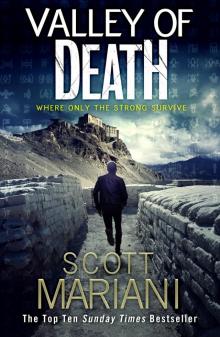 Valley of Death
Valley of Death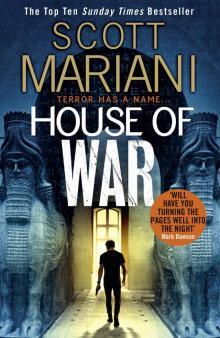 House of War
House of War The Pandemic Plot
The Pandemic Plot The Pretender's Gold
The Pretender's Gold The Demon Club
The Demon Club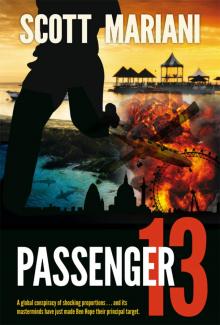 Passenger 13 (Ben Hope eBook originals)
Passenger 13 (Ben Hope eBook originals)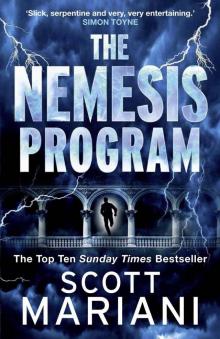 The Nemesis Program_Ben Hope
The Nemesis Program_Ben Hope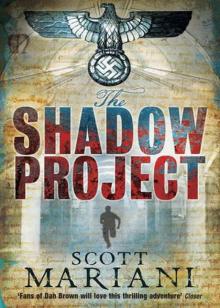 The Shadow Project
The Shadow Project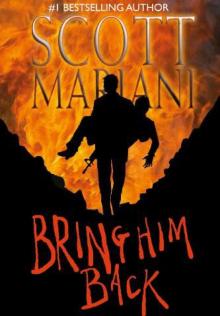 Bring Him Back
Bring Him Back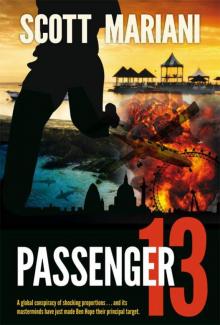 Passenger 13
Passenger 13 Sacred Sword (Ben Hope 7)
Sacred Sword (Ben Hope 7) The Sacred Sword (Ben Hope 7)
The Sacred Sword (Ben Hope 7) Sacred Sword
Sacred Sword The Babylon Idol
The Babylon Idol The Armada Legacy
The Armada Legacy The Heretic's Treasure
The Heretic's Treasure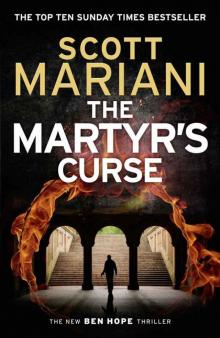 The Martyr’s Curse
The Martyr’s Curse DECOY (Kindle Single)
DECOY (Kindle Single) The Bach Manuscript
The Bach Manuscript The Alchemist's Secret
The Alchemist's Secret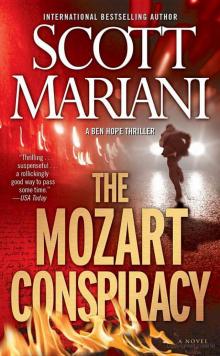 The Mozart Conspiracy: A Novel bh-2
The Mozart Conspiracy: A Novel bh-2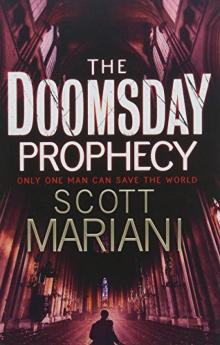 The Doomsday Prophecy
The Doomsday Prophecy The Ben Hope Collection: 6 BOOK SET
The Ben Hope Collection: 6 BOOK SET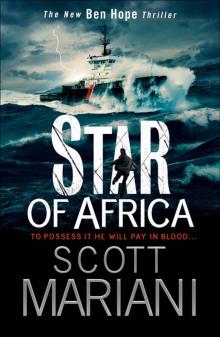 Star of Africa (Ben Hope, Book 13)
Star of Africa (Ben Hope, Book 13)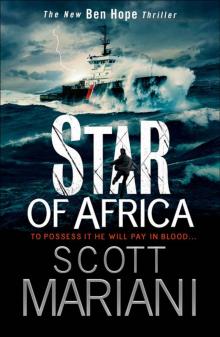 Star of Africa
Star of Africa The Forgotten Holocaust (Ben Hope, Book 10)
The Forgotten Holocaust (Ben Hope, Book 10) The Devil's Kingdom
The Devil's Kingdom The Lost Relic
The Lost Relic The Armada Legacy bh-8
The Armada Legacy bh-8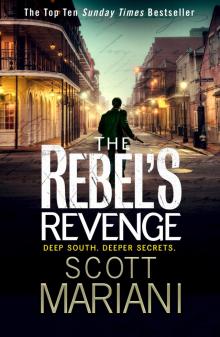 The Rebel's Revenge
The Rebel's Revenge The Forgotten Holocaust
The Forgotten Holocaust The Lost Relic bh-6
The Lost Relic bh-6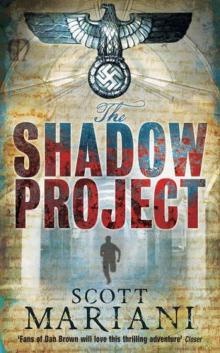 Ben Hope 05 - The Shadow Project
Ben Hope 05 - The Shadow Project The Mozart Conspiracy
The Mozart Conspiracy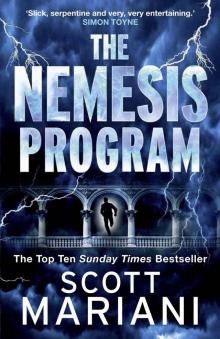 The Nemesis Program
The Nemesis Program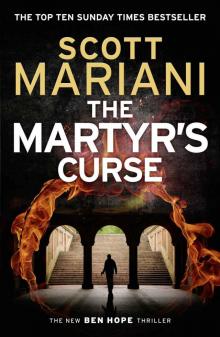 The Martyr’s Curse (Ben Hope, Book 11)
The Martyr’s Curse (Ben Hope, Book 11) THE TUNNEL: A Ben Hope Story
THE TUNNEL: A Ben Hope Story The Sacred Sword bh-7
The Sacred Sword bh-7 The Moscow Cipher
The Moscow Cipher The Shadow Project bh-5
The Shadow Project bh-5 The Tunnel
The Tunnel The Moscow Cipher (Ben Hope, Book 17)
The Moscow Cipher (Ben Hope, Book 17)